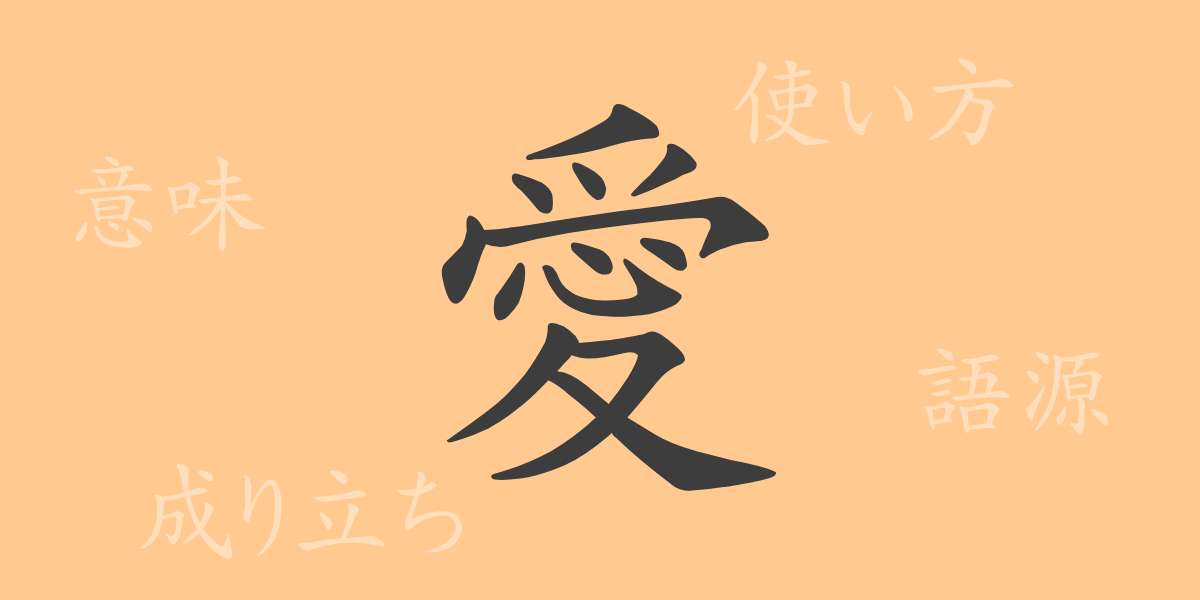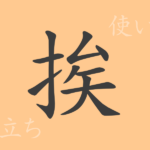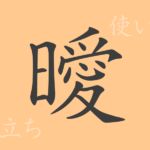“
Everyone experiences the emotion of ‘愛’ (Ai, love), which brings joy to life and fosters deep bonds. This small character holds infinite possibilities and deep meanings. ‘愛’ (Ai, love) moves human hearts and transcends cultures and languages with its universal value. This article delves deeply into the commonly used Kanji ‘愛’ (Ai, love) in Japan, exploring its origins, meanings, usage, readings, and phrases and idioms related to love.
Origins of 愛 (Ai, Love)
The etymology of ‘愛’ (Ai, love) dates back to ancient China. The character initially combined ‘心’ (Shin, heart), symbolizing the heart, with ‘受’ (Ukeru, to receive), representing acceptance. This fusion symbolized accepting and responding to another’s heart, embodying the essence of love. Over time, the character evolved, with the current form of ‘愛’ sometimes said to depict the shape of a hand embracing, indicated by ‘爫’ (Tsume, claws) at the top.
Meaning and Usage of 愛 (Ai, Love)
‘愛’ (Ai, love) encompasses a broad concept of emotions, actions, and thoughts. It is often used to describe deep emotional bonds between people, whether in family, friendships, or romantic relationships, and also expresses passion or fondness for activities and things. Words such as ‘愛する’ (Aisuru, to love), ‘愛情’ (Aijou, affection), and ‘愛着’ (Aichaku, attachment) all include this character.
Readings, Stroke Count, and Radical of 愛 (Ai, Love)
The Kanji ‘愛’ (Ai, love) is a character rich in expressive potential in Japanese.
- Readings: On’yomi ‘Ai’, Kun’yomi include ‘Ito-shi’ and ‘Mede-tashi’.
- Stroke Count: ‘愛’ has 13 strokes.
- Radical: The radical for ‘愛’ is ‘心’ (Shin, heart), directly linking to its meanings of emotions and love.
Phrases and Idioms Using 愛 (Ai, Love)
Japanese contains many idioms and phrases that include ‘愛’ (Ai), expressing various aspects of love:
- 愛情 (Aijou) – Attachment or affection.
- 愛護 (Aigo) – Care and protection, valuing something dearly.
- 愛着 (Aichaku) – A deep emotional attachment to a person or object.
- 愛好 (Aikou) – Fondness or enjoyment of something.
- 愛国心 (Aikokushin) – Patriotic spirit, loving and wishing for the prosperity of one’s country.
- Idiom ‘愛想を尽かす’ (Aiso wo tsukasu) – To run out of patience or affection.
- Proverb ‘愛は盲目’ (Ai wa moumoku) – ‘Love is blind,’ meaning one cannot see the faults of the person they love.
Summary of 愛 (Ai, Love)
The Kanji ‘愛’ (Ai, love) represents some of the strongest and most beautiful human emotions. It is used to express the bonds with family, friends, lovers, and even passions for hobbies and objects. ‘愛’ (Ai, love) pervades every aspect of our lives, packed with many values cherished by people. Understanding this character allows us to appreciate the depth of human emotions and the
“

























